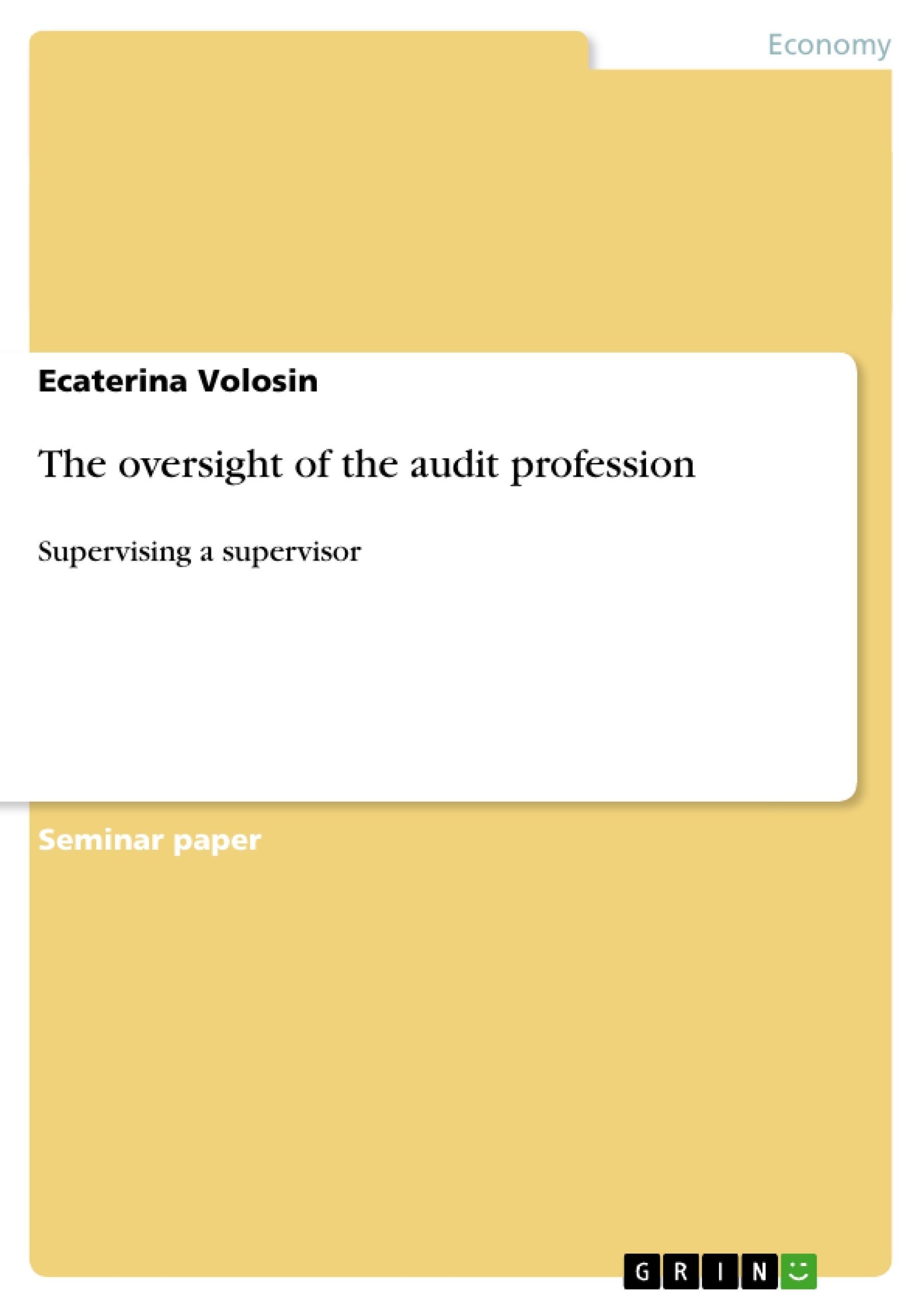This paper provides an overview of the current regulatory frameworks for financial reporting
and auditing in the UK, US and Germany. During the last years these frameworks were
noticeably changed. These changes arose especially from political interest in accounting
regulation following the Enron collapse. The main change in the US was the introduction of
the Sarbanes-Oxley Act containing strict regulations for auditors, including their
responsibilities and services. It also contains a list of prohibited audit activities, the so-called
“non-audit” services. The main feature of the Act was the creation of an oversight board to
regulate and control auditors of public companies. Thus the “Public Company Accounting
Oversight Board” was established. The PCAOB is a private-sector non-profit overseer,
supervised by the US Securities Exchange Commission (SEC) which regulates basically
anything related to the securities market.
Following the collapse of Enron and the turbulence in the UK markets that followed, a review
of financial regulation in the UK was ordered, covering for example auditor independence,
corporate governance, financial reporting and auditing standards and accountability of audit
firms. In order to restore credibility in UK accounting the Financial Reporting Council (FRC),
an independent private sector body funded by the accountancy profession, was set up. The
FRC has several subsidiary bodies, including the Professional Oversight Board (POB)
providing independent oversight of the regulation of the auditing profession.
The German Auditor Oversight Commission (AOC) was established according to the Auditor
Oversight Law. It is in charge of the public oversight of all activities of the German Chamber
of Public Accountants (WPK) with respect to statutory auditors. The Commission has the
ultimate responsibility in the areas of licensing, registration, disciplinary investigations and
quality assurance, all with respect to members of WPK entitled to provide statutory audit
services (WPK, n.d.).
It is argued that these new regulations impose another layer of bureaucracy with significant
costs for very little apparent gain. But ethical issues surrounding the public’s perception of
auditor performance need to be addressed, not just for the sake of the profession, but for the
efficiency and effectiveness of capital markets in general (Malthus and Scoble, 2005).
Inhaltsverzeichnis (Table of Contents)
- Executive Summary
- Introduction
- The Audit Oversight
- Oversight System in the US
- Oversight System in the UK
- Oversight System in Germany
- Comparison of the US, UK and German Systems
- Evaluation
- Conclusion
- Bibliography
Zielsetzung und Themenschwerpunkte (Objectives and Key Themes)
This paper explores the regulatory frameworks for financial reporting and auditing in the UK, US, and Germany, specifically examining changes implemented following the Enron collapse. The paper investigates the objectives and impact of these regulatory frameworks, focusing on their effectiveness in restoring public trust in financial information.
- The impact of the Enron collapse on global audit oversight systems.
- A comparative analysis of audit oversight systems in the UK, US, and Germany.
- The effectiveness of regulatory changes in restoring public trust in financial information.
- The challenges and costs associated with implementing and maintaining robust audit oversight.
- The role of ethical considerations in auditor performance and public perception.
Zusammenfassung der Kapitel (Chapter Summaries)
The executive summary provides a concise overview of the regulatory changes in financial reporting and auditing in the UK, US, and Germany, highlighting the impact of the Enron collapse. It introduces the Sarbanes-Oxley Act in the US, the Financial Reporting Council (FRC) in the UK, and the German Auditor Oversight Commission (AOC). The introduction further explains the rationale for an independent audit oversight system, emphasizing the need for public protection and credibility of financial information.
The chapter titled "The Audit Oversight" delves into the specific oversight systems of the US, UK, and Germany, discussing their respective regulatory bodies, responsibilities, and changes implemented since their establishment. This section examines the functions of these bodies, particularly their roles in licensing, registration, disciplinary investigations, and quality assurance.
The chapter on "Evaluation" analyzes the effectiveness of the implemented oversight systems, addressing both the positive aspects and criticism received from the public. It examines the impact of these regulations on various stakeholders and discusses the costs and benefits associated with these systems.
Schlüsselwörter (Keywords)
This paper focuses on the oversight of the audit profession, including key concepts such as audit oversight, regulatory frameworks, financial reporting, auditing, Sarbanes-Oxley Act, Financial Reporting Council (FRC), German Auditor Oversight Commission (AOC), auditor independence, corporate governance, and public trust in financial information.
Frequently Asked Questions
What is the Sarbanes-Oxley Act (SOX)?
SOX is a US law introduced after the Enron scandal to increase the accountability of auditors and corporate management, creating the PCAOB for oversight.
How is the audit profession regulated in the UK?
The Financial Reporting Council (FRC) acts as the independent regulator, with the Professional Oversight Board (POB) specifically monitoring the auditing profession.
What is the function of the German Auditor Oversight Commission (AOC)?
The AOC provides public oversight of the German Chamber of Public Accountants (WPK) and is responsible for licensing, quality assurance, and investigations.
What are "non-audit" services in this context?
These are services (like consulting) that auditors are prohibited from providing to their audit clients under SOX to ensure auditor independence.
Why is audit oversight important for capital markets?
Robust oversight restores public trust in financial information, which is essential for the efficiency and effectiveness of global capital markets.
- Quote paper
- Ecaterina Volosin (Author), 2007, The oversight of the audit profession, Munich, GRIN Verlag, https://www.grin.com/document/116910



